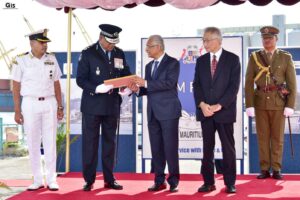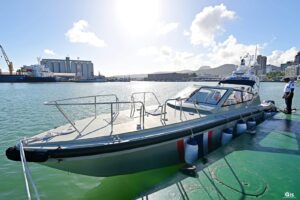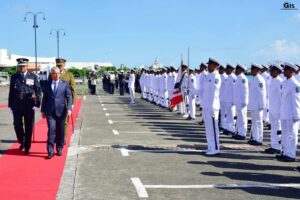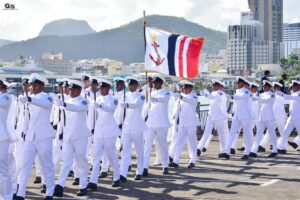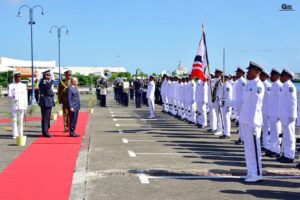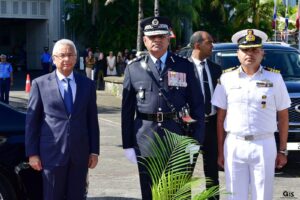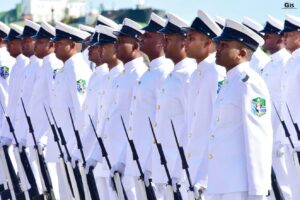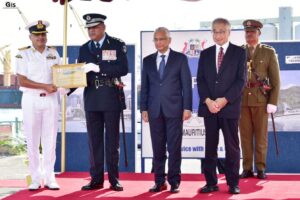Mauritius: Mauritius government held a ceremony between two Yamaha High Speedboats 1202 to the National Coast Guard (NCG) this morning at Marina Quay in Port Louis. The Prime Minister, Pravind Kumar Jugnauth, expressed his gratitude to the Japanese Government for its much-valued and appreciated support to Mauritius and his wish that the long-standing relationship and cooperation between the two island nations would be further heightened.
The Minister of Land Transport and Light Rail, and Minister of Foreign Affairs, Regional Integration and International Trade, Alan Ganoo; the Ambassador Extraordinary and Plenipotentiary of Japan, Shuichiro Kawaguchi; members of the Diplomatic Corps; and other eminent personalities were present at the event.
In his address, PM Jugnauth asserted that the handing over of the two High Speedboats illustrated the strong ties and close cooperation between Mauritius and Japan. “Whilst Government remains unflinching on the issue of national security, we recognise that the success of our efforts hinges on the strength of our ties with friendly countries and their readiness to collaborate with us,” he asserted.
The Prime Minister informed that the two boats were part of the programme initiated in 2019 during his visit to Japan, where the Japanese Government extended a grant of ¥300 million to Mauritius for the procurement of maritime security materials to ensure that the NCG was better equipped to safeguard the country’s maritime interest. In addition to these two boats, the grant caters for four other high-speed boats and one 4×4 vehicle.
Moreover, PM Jugnauth affirmed that he was grateful to Japan for its assistance in various sectors. “Its support has bolstered our country’s effectiveness in fields such as climate change, disaster management, and maritime security,” he stated.
He thus indicated that Officers from the Mauritius Police Force and other Ministries had benefitted from the training offered by the Japan International Cooperation Agency, on disaster risk reduction and on combatting oil spills.
According to the Head of Government, the cooperation between the two countries had also led to the formulation of various master plans and the setting up of a disaster management infrastructure. He recalled that the Japanese Government was offering a further grant of Rs 500 million for the replacement of the coastal surveillance radar system of the NCG. On that score, he apprised that consultants from Japan had already carried out surveys in Mauritius, Rodrigues, Agalega and St Brandon, adding that a bidding exercise would take place shortly and that implementation of the project was expected soon afterwards.
Furthermore, the Prime Minister reaffirmed the Government’s commitment to the security of the country and that of the territorial waters, reiterating that the national safety of the citizens had always been a priority issue. He underscored that as an island state with a vast Exclusive Economic Zone spanning over 2.3 million km2, Mauritius was exposed to maritime-related threats.
“We have had instances where foreign vessels fishing illegally in the country’s Exclusive Economic Zone had been intercepted, and where criminals linked with drug trafficking and operating in the territorial waters of Mauritius had been arrested,” he declared.
Mr Jugnauth stressed that it was, therefore, imperative for the country to possess operational capabilities to effectively police the Exclusive Economic Zone and safeguard against criminal activities.
Hence, for the Prime Minister, the induction of the two High Speedboats would significantly expand the capacity of the NCG and allow it to handle a more diverse range of operations to protect the maritime territory, as well as contribute towards effective management of search and rescue operations around the island. PM Jugnauth seized the opportunity, too, to place on record the professionalism displayed by the NCG in matters pertaining to maritime security.

For his part, the Japanese Ambassador underlined that the cooperation between his country and Mauritius had reached another step with the handing over of the two boats. He talked of his conviction that the cooperation would continue to be fruitful and make an overall positive impact on both countries’ relationships.
While insisting that peace, stability, human safety and well-being were prerequisites of social and economic development, Mr Shuichiro Kawaguchi spoke of maritime safety as an essential condition for developing the ocean economy and ensuring human security.
“This assistance of speedboats is of utmost importance as the region should be protected from all dangers such as drug trafficking, illegal fishing, pollution and threats to climate change and also engaged in the rescue operation,” he averred.
Main features of the High Speedboats
Of length of 12 metres and width 2.6 metres, these boats can speed off across open waters at up to 50 knots. They have a cruising range of about 200 nautical miles and can carry up to seven persons. They will be used for defence, interception of high-speed craft, coastal patrol, effective surveillance, anti-smuggling and anti-poaching activities, search and rescue, as well as fisheries protection.


